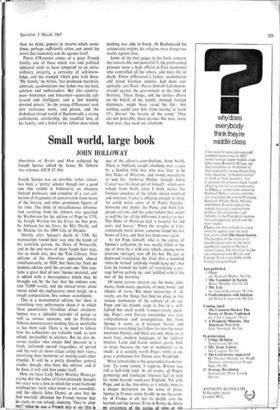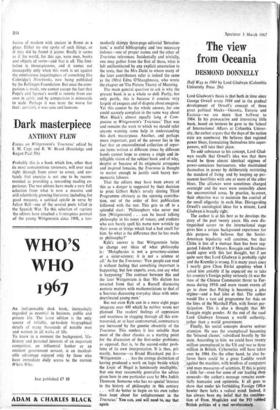Small world, large book
JOHN HOLLOWAY
Anecdotes of Books and Men collected by Joseph Spence edited by James M. Osborn two volumes (OUP £7 10s)
Joseph Spence was an amiable, rather colour- less man, a 'pretty' scholar though not a good one (the verdict is Johnson's), an absentee Oxford professor, and compiler of a vast col- lection of fragments of conversation from many of the literary and other prominent figures of his time. The mine of miscellaneous informa- tion resulting from his labours was quarried by Warburton for his edition of Pope in 1751, by Joseph Warton for his Essay on that poet, by Johnson for his Lives, by Mrs Thrale, and by Malone for his 1800 Life of Dryden.
Shortly after Spence's death in 1768, his manuscripts found their way into the hands of his erstwhile patron, the Duke of Newcastle, and in the end most of them found their way, like so much else, into the Yale Library. Two editions of the Anecdotes appeared, almost simultaneously, in 1820, but there has been no modern edition until the present one. This con- tains a great deal of new Spence material, and is edited with a thoroughness which may be brought out by the fact that the indexes con- tain 75,000 words, and the textual notes alone (never mind the explanatory ones) weigh, on a rough computation, five ounces avoirdupois.
This is a monumental edition, but there is something very unfortunate about it to which these quantitative frivolities direct attention. Spence was a splendid recorder of gossip as well as serious opinions, and (as Professor Osborn demonstrates) nothing like as unreliable as has been said. There is no need to labour how his collections are valuable (and, as now edited, invaluable) to scholars. But he also de- serves 'readers who simply find pleasure in a fresh, informed record (regardless of period and the rest) of clever chaps airing their views, exercising their memories or making each other chuckle. It will be a pretty dauntless general reader, though, who buys this edition; and if he does, it will sink him under itself.
Here we have Lady Mary Wortley Montagu saying that the ladies of Constantinople thought her stays were a box in which her cruel husband confined her (with what intent is not recorded); and the elderly John Dennis so sure that he had mortally offended the French nation that he starts to run inland, shouting 'They're after me!' when he sees a French ship at sea (this is one of the editor's contributions, from Swift). There is Addison, caught climbing over a gate by a fiendish little boy who was later to be first Duke of Wharton, and swung mercilessly to and fro. Ambrose Philips thought Julius Caesar was the dead spit of himself : which pro- voked, from Swift, what I think makes the funniest anecdote of the whole sixteen hundred and nineteen. Locke is obliging enough to think 'he could make sense of St Paul's Epistles.' Someone else thinks the Punic and Irish lan- guages are one and the same (which they might as well be, for all the difference it makes to me). The Duke of Montagu had 'a hospital for old cows and horses.' When the seraglio at Con- stantinople burnt down, someone found the lost books of Livy, and then lost them over again.
As for Pope himself, who is the centre of Spence's collection, he was nearly killed at the age of three by a wild cow which, among more grievous outrages, tore off his hat. He got so depressed translating the Iliad that a hundred times he wished 'anybody would hang me'; but later he formed the habit of translating a pas- sage before getting up, and 'piddled with it the rest of the morning.'
Of more serious interest are the many judg- ments, from many speakers, of men, books and objects of vertu. But most interesting of all, surely, are the things that find no place in this unique monument of the culture of an age. Pope and his friends seem to live in a well- lighted but small world. Comparatively speak- ing, Pope's own literary knowledge was very comprehensive and cosmopolitan; but from Spence it seems as if between Statius and Chaucer everything lay fallow for him (he never mentions Dante), and there are only three, or at most four, modern languages of the slightest interest. Latin and Greek authors partly bulk so large, because the run of modernity is so small: it is actually worth Pope's while to ex- press a preference for Donne over Randolph.
More remarkable is the geographical constric- tion. To some extent, I suppose, Britain was still a half-wild land. At all events, all Pope's gardening and landscape interests fail to turn his mind beyond south-east England. Yet with Pope, and in the Anecdotes as a whole, there is a deeper restriction on the sense of place. Spence in France seems hardly to see the coun- try of France at all, nor its people save the learned and the literati. Even in Rome, he shows no awareness of the oatina of time nr the fusion of modern with ancient in Rome as a place. Either no one spoke of such things, or if they did he found it jejune. Really it seems as if the world, for this age, were men, books and objects of vertu—and that is all. The limi- tation is inconspicuous, and it comes out inescapably only when this work is set against the omnivorous inquiringness of something like Coleridge's Notebooks, now being published by the Bollingen Foundation. But once the com- parison is made, one cannot escape the fact that Pope's and Spence's world is remote from our own in spirit, and by comparison is minuscule in scale. Perhaps it was none the worse for that: certainly it was sane and humane.



































 Previous page
Previous page